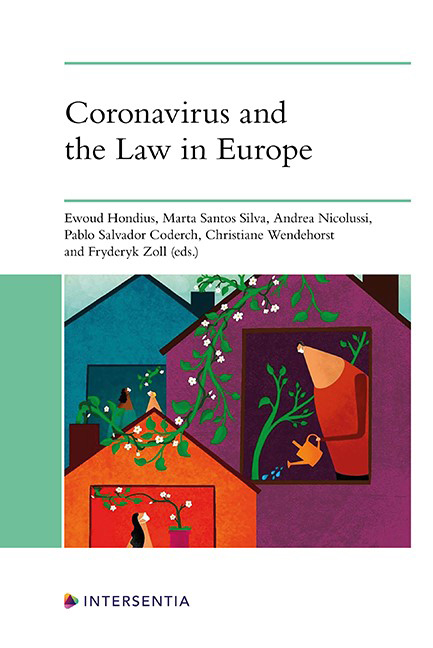Book contents
- Frontmatter
- Preface
- Contents
- List of Keywords
- List of Contributors
- PART I COVID-19 AND FUNDAMENTAL RIGHTS
- PART II STATES AGAINST THE PANDEMIC
- PART III COMPENSATION FOR COVID-19 RELATED DAMAGE
- PART IV CONTRACT LAW
- PART V CONSUMER LAW
- PART VI LABOUR AND SOCIAL LAW
- PART VII CORONAVIRUS CHANGING EUROPE
- Epilogue
- Annex: ELI Principles for the COVID-19 Crisis
- About the Editors
Residential and Commercial Leases Amidst the Coronavirus Crisis: The Spanish Case in Context
Published online by Cambridge University Press: 10 December 2021
- Frontmatter
- Preface
- Contents
- List of Keywords
- List of Contributors
- PART I COVID-19 AND FUNDAMENTAL RIGHTS
- PART II STATES AGAINST THE PANDEMIC
- PART III COMPENSATION FOR COVID-19 RELATED DAMAGE
- PART IV CONTRACT LAW
- PART V CONSUMER LAW
- PART VI LABOUR AND SOCIAL LAW
- PART VII CORONAVIRUS CHANGING EUROPE
- Epilogue
- Annex: ELI Principles for the COVID-19 Crisis
- About the Editors
Summary
The Spanish emergency lawmaker has been prompted to take protective measures for tenants during the COVID-19 crisis. Such measures distinguish between residential and commercial leases. All of them are presented in the present contribution from a critical perspective. Commercial leases deserve special attention due to their economic relevance, and because of the intense debate among Spanish scholars on the applicability of the rebus sic stantibus doctrine, or any of its equivalents, to adapt the contract if commercial tenants are affected by the exceptional measures imposed by the Government to deal with the COVID-19 health crisis.
THE TENANT's PROTECTIVE MEASURES IN CONTEXT
Tenancy market is a case study in each and every micro-economics course. Legislation is prompted to grant quick and effective solutions to the demand of residential and commercial spaces, while supply is rigid. While demand reacts in the short term on several economic and social grounds, such as the mobility rate of the population, supply is subject to the availability of buildings and premises. In the case of residential leases, the obvious connection between affordable housing and the effective deployment of fundamental rights makes the issue very sensitive from both the social and legal perspective. Lawmakers all over the world face the difficulties of promoting a fair and affordable rental market. Subsidies for promoting more rentals seek equilibrium with the liberalisation of the market, the protection of property rights and securing tenure.
The situation sounds familiar to every specialist in the field, and the situation in Spain is no different. Tenancy regulations face similar problems all over Europe, where housing problems prompt legislative measures everywhere in order to amend negative side effects produced by the market. The crisis caused by COVID-19, common to all European jurisdictions, has enhanced the necessity to protect tenants. This contribution presents the legislative measures taken by the Spanish emergency lawmaker, forced to deal with a tenancy market that presents some specific features, which make the issue much more complicated in Spain than in other European countries.
The current situation of the tenancy law in Spain can be summarised by three different structural problems: legislative, geographical and economical.
- Type
- Chapter
- Information
- Coronavirus and the Law in Europe , pp. 911 - 932Publisher: IntersentiaPrint publication year: 2021

